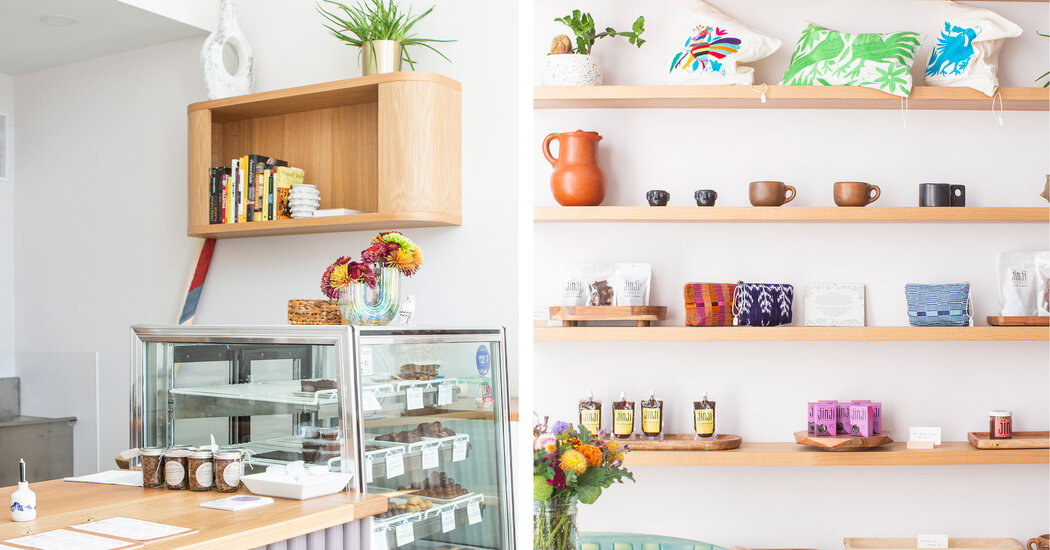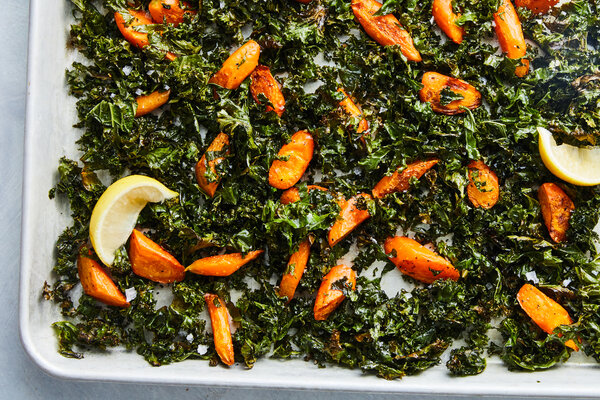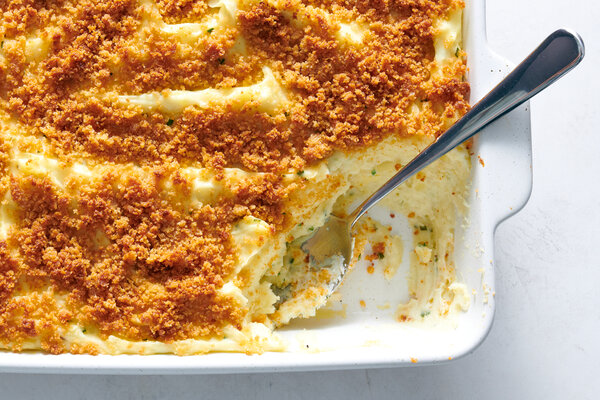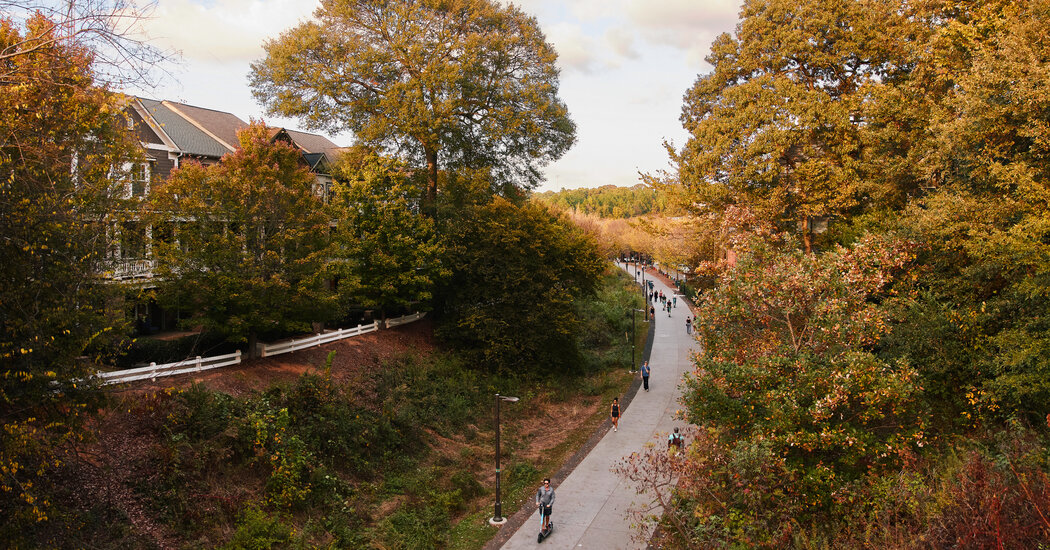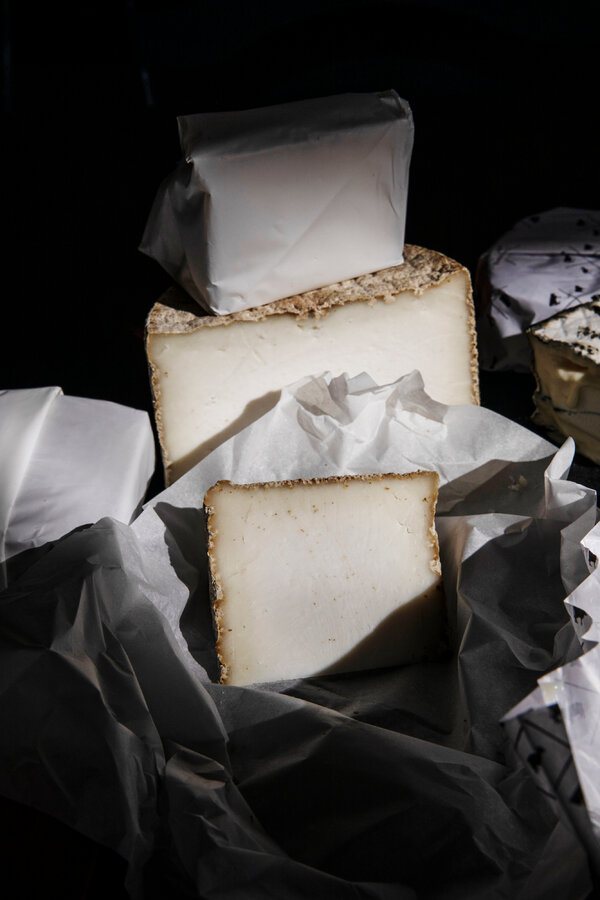I shower and wash my face with La Roche-Posay Toleriane Dermo Milky Cleanser. I like to use body washes that I bring back from my travels to remind me of those trips: I have this Kokum Almond Cleansing Shower Oil that I got on a trip to India that smells so good. Because I dye my hair, it’s quite thirsty — I use L’Oréal Professionnel Purple Shampoo to keep the yellow out, and Davines Oi Conditioner. I always use Davines Minu Hair Serum when I blow dry my hair and finish with Oi Oil.
La Prairie’s Skin Caviar Liquid Lift wakes my skin up. For moisture, I use Skin Caviar Luxe Cream and then every second or third day, I’ll put on Skin Caviar Harmony L’Extrait. I feel like it’s feeding my skin. For makeup, I basically only wear a light bronzer to even out my skin tone, mascara and a little bit of an eyebrow wand. This New Zealand brand called Thin Lizzy has a 6in1 Professional Face Powder Compact that I’ve used for 18 years. I’ve tried to find fancy alternatives, but there’s just nothing as good as this. For mascara, I use MACStack; the eyebrow wand is MAC Eye Brows Big Boost Fibre Gel. If I’m going out, I like to wear Chanel lipstick in a hard-core vampy red, like the shade 57 Rouge Feu, with a gloss. Or I have a Chanel brow product that I’ll put on my eyes quite heavily. All day long I wear Burt’s Bees Beeswax Lip Balm. I was recently on a work trip to Atlanta and picked up a new flavor, Cucumber Mint. I use Byredo Vetyver Lotion on my body, and in the studio I have La Prairie Cellular Hand Cream to give my hands a bit of attention after I’ve done labor- intensive stuff.
At night, I wash my face with water, and just before going to bed I put on Skin Caviar Nighttime Oil. I love the way it smells. For perfume, I’m currently wearing Byredo Blanche. I like the fresh cottony smell of that. My friends have this brand called Aeir and my boyfriend wears their Virgin Olive scent; another one we like is Grand Rose. He layers them. I’m a big bath person and I have this supernice oil from Susanne Kaufman. I smell delicious afterward and my skin is so nourished. My favorite scent in the whole world is mimosa. When I can’t get that smell from the flower itself, I like to burn Diptyque’s candle. I also have this maple syrup candle that is insanely good. A lot of wintry smells are spicy and this doesn’t have that at all — it’s still fresh.
Majorca’s creative renaissance might be easiest to access in its capital, the city of Palma, a short direct flight from European cities like London and Paris. Ambitious restaurants, world-class galleries and independent boutiques are tucked between Gothic and Art Nouveau architecture and, in the last decade or so, several historic palazzos have been transformed into exceptional boutique hotels. The latest is Portella, a 14-room property opened this week by the brother-and-sister team Enrique and Inés Miró-Sans (she previously launched Casa Bonay, a fashionable hotel in Barcelona) and designed by the Paris-based design duo Festen. Hugo Sauzay, a co-founder of Festen along with his partner, Charlotte de Tonnac, says the couple intended to create “an oasis of calm and green in the city.” They drew on the history of the 17th-century palazzo, which is near Palma’s 11th-century Arab baths. Ten of the bedrooms include a small kitchen, but otherwise each is unique. One has a Joan Miró lithograph hanging over a long, cobalt blue couch surrounded by vintage Moroccan chairs. De Tonnac and Sauzay worked with local artisans such as the heritage glass company Gordiola to create a number of bespoke pieces. Visitors can spend time in the larger open kitchen on the ground floor or in the leafy courtyard, both closed to the general public. “We want guests to feel like it’s their home,” says Inés Miró-Sans, “but the most idealistic and indulgent version of one.” From about $320 a night, portellapalma.com.
Visit This
A Store That Celebrates the ‘Spiritual Side’ of Cacao
Jinji Fraser wants you to rethink how you consume chocolate. In October, she and her father, Guy Fraser, opened Jinji Chocolate, a shop in Baltimore’s Waverly neighborhood that pays homage to Indigenous traditions in the Caribbean and Mesoamerica by serving seven types of drinking chocolate, both hot and cold. After launching the business in 2012 — the Frasers sold chocolate online and through a food market before establishing their own space — Jinji traveled to Belize and Ecuador, among other countries, to visit farms and study the origins of the bean. “There’s just this reverence for the energetic and spiritual side to cacao [in those places],” she says, “and the way that they enjoy chocolate is through drinks.” Recently, she discovered that her grandfather’s family held a land trust in a cacao-rich area of Guyana, deepening her personal connection to the fruit.
The company’s signature bitter drinking chocolate, a rich and dense concoction served in an espresso-size cup, is made with freshly ground cacao nibs, lightly sweetened and finished with oat milk. Visitors will also find horchata-flavored bars, chocolate spreads and truffles in distinctive flavors, including curry tamarind, saffron rose and pistachio cardamom released this month for Valentine’s Day. All of the chocolates combine local ingredients with cacao sourced from family-owned farms in Trinidad and Peru. From about $3, jinjichocolate.com.
This past summer, new federal energy-efficiency regulations went into effect, preventing the sale of most incandescent light bulbs. This prompted some hand-wringing among interior designers: Early versions of the comparatively efficient LED bulbs produced light that was stark and cold, more evocative of a convenience store than candlelight. But the good news, say experts, is that LEDs are way better than they used to be — it’s just a matter of understanding what to look for. “What matters most is the bulb’s color temperature, which is measured in degrees Kelvin,” says the lighting designer Jean Pelle, who likes her bulbs at a “warm, inviting” 2700 K. “In my opinion, 2400 K can be too yellowy, while 3000 K begins to look like a department store,” she explains. The other factor to consider is the bulb’s CRI (or color rendering index), which Pelle recommends at 90 or above. “At home, we use bulbs from RAB, which are readily available and create a nice light,” she says. Interior stylist Benjamin Reynaert, another lighting obsessive, agrees that “low-wattage bulbs with a soft glow” are essential for creating a cozy ambience. His go-to for table lamps is the Schoolhouse Matte Porcelain LED bulb. “They are pricey but last forever,” he says. Heide Hendricks, a co-founder of the Connecticut-based design firm Hendricks Churchill, recommends bulbs from Tala, a British company known for its eco-friendly statement bulbs. “They come in a range of shapes and emit beautiful, incandescent-like light,” she says, noting that they’re ideal for fixtures with exposed bulbs. For lamps and fixtures with concealed bulbs, she has another go-to: the Philips LED dimmable A19 in warm white. “It’s a less expensive workhorse,” she says.
Eat Here
A Minneapolis Restaurant Where the Pasta Is Handmade and the Interiors Evoke Summer
The chef Joe Rolle had been working in Minneapolis restaurants for 18 years when he decided to open his own place. He asked his former co-worker, the bartender Stephen Rowe — who refined his cocktail-making skills at the city’s now-closed Marvel Bar, known for its experimental drinks — to be his partner. At the end of January, the pair opened Dario, an Italian-leaning restaurant in the city’s North Loop neighborhood. One star of the menu is Rolle’s Doppio Ravioli, filled with half sunchoke purée and half whipped ricotta, served with brown butter, honey, fried rosemary and hazelnuts. To accompany the dish, Rowe created the Bad Apple, a cocktail featuring vermouth and Calvados. Dario’s pastas are made by hand daily in a room at the back of the restaurant. In the evening, that space, with its 14-foot butcher block table, becomes a communal dining area. In the main dining room, the interiors are textured and summery: Potted plants fill the corners, banquettes are upholstered in teal velvet and an oceanic gray-blue and, at the bar, custom-made pink stools line up like flamingos. dariorestaurant.com.
From T’s Instagram



